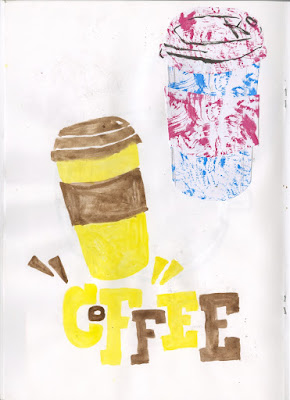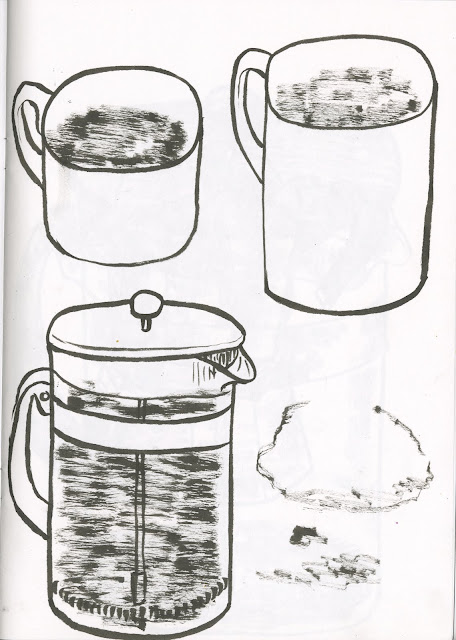End of Module Student Evaluation
BA(hons)
Illustration
Module
Code: Visual Skills OUIL405 Visual Narratives
Name:
Abigail Woolley
Student
ID: aw258410
Please identify where the evidence for each of the learning outcomes
is within your submission and how well you feel you have met the learning
outcomes. Please also grade yourself in relation to the learning outcomes using
terms:
> poor, satisfactory, good,
very good, excellent (Note- This is
so that the team have an understanding of how well you feel you have done. It
is not an indication of the actual grade you may receive)
Learning Outcome
|
Evidenced
where?
Blog,
Sketchbook, Roughs Final Illustrations, development sheets etc. (No more than 75 words)
|
Your
grade
Using words:
> poor,
satisfactory, good, very good, excellent
|
4A6
Demonstrate a range of approaches to research in the collection,
development and communication of source material.
|
Sketchbooks, blog
|
satisfactory
|
4B5
Explore individual responses to creative opportunities, source
material and visual research appropriate to set briefs and identified
problems.
|
Sketchbooks, blog
|
good
|
4C6
Select and investigate appropriate practical approaches to the
investigation of visual development and communication of source material in
response to a brief.
|
Sketchbooks, blog
|
Very good
|
4C7
Explore appropriate processes and techniques in the visual development
of ideas relating to narrative, sequence and content.
|
Sketchbooks, blog, final illustrations
|
good
|
4D5
Demonstrate an effective use of
appropriate methods of recording, documenting and evaluating individual
progress.
|
Sketchbooks, blog
|
good
|
Evaluation (See
guidance below for more information)
You are required to write a 500 word
evaluation of this module.
Overall, I think I’ve engaged quite well
with this module, particularly towards the end. I struggled mostly with the
research element but I think towards the end I got better at this. For
example, with the first brief I wasn’t sure what to draw or collect around
leeds, and the same with the field trip in the second brief. Once I had
changed my project though, my research improved and I think this is just
because I had more of a solid direction to work in.
I got better at using my research to
inform my project once I’d changed my idea. I tried to explore a range of
different research methods, like asking people about their favourite coffee,
where they’ve had it etc and this helped me get to the conclusion that I
should base my picture book on my own experiences with coffee to make it more
personal and informed.
The main thing I learnt in this module is
media experimentation. For my picture book I used ink drawings and tissue
paper and combined them digitally which I think was quite effective and
definitely something I am going to use again or develop further.
My picture book was the most successful
part of this module I think. I’m really pleased with the observational
drawings and experimentation and development I did for this brief and how I
refined these down to create the book itself. I think I was quite prolific as
well and worked through the different stages of my project logically.
Another part of this module that went
quite well was the group screenprint. Although I found the research aspect
difficult, I was really pleased with the end result. We had managed to
combine lots of different media and techniques and I think the finished
screenprints turned out really interesting.
There were lots of parts of this module
where I got stuck and lost momentum, but I think I dealt with them quite
well. I think the main problem for me was research, and I didn’t know how to
research things effectively to give me ideas to work with. I hit a
particularly difficult dead end with the picture book project when I went
down the route of anti-consumption and repurposing things, because after a
lot of research I realized I didn’t have anything interesting to build a
narrative out of so I had to restart the project. Despite this, it worked out
quite well because I enjoyed the coffee based idea much more so I found it
easier to do lots of work.
I’ve learnt a lot from this module that I
can apply to future work. I think the main things that I’ve learnt are how to
use research more effectively and media experimentation (I’m glad I managed
to move away from using fineliners in this project and I’m really happy with
the results). I also feel like I’ve really got into the swing of working in
this project, and just working my ideas out in sketchbooks and I think this
will hopefully continue into future projects.
|
Evaluation
Guidance
This
should be a reflective summary of your experience across the module, with a
focus on SB2 & SB3
-
Overall, how well do you feel
you have engaged with this module.
-
What learning took place? What
was useful to you?
Be specific. New skills? New methods? New processes or approaches?
Did you use the blog to reflect on your project development? Tell us about your
research- how did you use it to inform the intent of your project?
-
What went well and why? What
did you enjoy? What were you happy with as an outcome?
Be critical and analytical. Why did you enjoy it? Perhaps identify
particular sessions?
This could be ideas, solutions to problems, studentship or research.
How well did you use the studio? Did you invest enough time in the development
and testing of your outcomes? Where did you invest the most energy? When did
you feel positive and motivated?
-
What could you have done
better?
What were the problems you faced? Did you get stuck or lose
momentum? What did you do to overcome this? This could be in reference to
studentship, organization, blogging or studio practice.
-
Contextual research.
How have you used the analysis of other artists, peers or other
creative practitioners to inform your own approach? What are the principles,
ideas and approaches you have identified as relevant to you?
-
How can you apply what you have
learnt here for future modules and projects?
Application and future thinking. Things you would do differently
next time? What useful methods, processes and ideas will you take forward into
the next module?
You
may also want to consider:
Self-questioning: How did your thoughts and
opinions change as you progressed through the module?
Feedback: What other people (tutors and
peers) thought of work and how you responded to that feedback?
Research: Did you use contextual research
to inform your ideas, ways of thinking or understanding of the challenges set.
This may include further research of your subject matter, slides from the
presentations or use of the library.





































